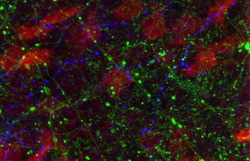
Postdoctoral fellow Kelly Glajch, PhD’12, recently received a Postdoctoral Fellowship for Basic Scientists from the Parkinson’s Disease Foundation (PDF). This one-year fellowship supports the research of young scientists at major research institutions.
Glajch, one of 10 recipients, will be investigating a relatively unstudied neural circuit formed between the striatum and the external globus pallidus areas of the brain. This region is part of the basal ganglia system, which plays a role in motor control and contributes to the motor symptoms of Parkinson’s disease.
“I want to better understand this relatively unstudied connection to the striatum in a normal state and in Parkinson’s disease,” she said. “I hope my research will translate into developing treatments for neurological diseases of the basal ganglia.”
Through her research, she seeks to understand the basic physiological properties of a novel connection, the pallidostriatal synapse, employing techniques – a combination of electrophysiology and optogenetics – that use light to activate the neuron cells. She then studies their output in a normal and a diseased state.
“I am interested in understanding how the basal ganglia functions,” Glajch said. “Our data suggests this connection to the striatum is altered in Parkinson’s disease. We still need to learn how that altered neuronal connection contributes to the symptoms we see in patients and if it is a pathway that might be a target for development of a novel therapeutic.”
Her interest in neurodegenerative diseases stems from her grandfather’s experience having Parkinson’s. When Glajch entered Northwestern University’s Interdepartmental Neuroscience PhD Program (NUIN), she decided to investigate this disease in the lab of D. James Surmeier, PhD, chair of physiology and Nathan Smith Davis Professor of Physiology. Glajch continued her studies for her postdoctoral education in the lab of C. Savio Chan, PhD, assistant professor in physiology.
“Out of 200 individuals who sent pre-proposals, Kelly was one of a select few chosen to receive an award,” said Chan. “This fellowship springboards a career in the field of Parkinson’s disease research. Past recipients have become faculty members at major research universities and have gone on to do prominent and creative things in the field. Kelly has a long-standing interest in neurodegenerative disease and her continued effort in this area is being recognized. More importantly, using a cutting-edge approach to activate a selective brain circuit, Kelly’s research promises to break new technical and intellectual ground.”






